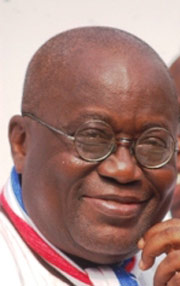Addo Akufo is the Man for Ghana

 |
| Nana Addo Dankwa Akufo-Addo |
Varied headlines tell how Ghana’s democracy is moving: Offinso South MP withdraws from primary; No negative political activities; police warn; Who stole whose manifesto?; Vote NPP for better economic management – Bawumia; Elections are about responsibility and good governance- French; NDC: We will ensure fair administration of justice.
Political parties are fighting over manifestoes. You have read about Paa Kwesi Nduom, the flag bearer of the Convention Peoples Party (CPP), rubbishing Sekou Nkrumah, of the main opposition National Democratic Congress (NDC), for suggesting that the CPP and the NDC are ideological soul-mates and should therefore merge. Captain (rtd) Boakye-Gyan, ex-spokesman for the erstwhile military junta Armed Forces Revolution Council (AFRC), thinks all the political parties are the same old, same old good-for-nothing organizations that he has opted to be an independent parliamentary candidate.
Now and then, in the last leg to the December 2008 general elections, the political temperature rises. Negativity flies all over the place with either a reckless speech from the unpredictable ex-president Jerry Rawlings; clashes in the north between the NPP and the NDC or a court dispute within the CPP over a primary election.
So, who is the best candidate at the Osu Castle to consolidate the on-going 16-year-old democracy that sometimes appears to shoot itself on the feet? Below is my personal assessment of the various presidential candidates’ capacities for consolidating democracy against the backdrop of developmental challenges.
Edward Nasigrie Mahama: Hopeless. Despite his People's National Convention (PNC) being a small party, he hasn’t been able to grow the PNC. He has not shown political savvy by either coalescing with ideological bedfellows like the NDC or the CPP. Mahama is viewed as an autocrat who lacks democratic characteristics expected of the new democratic dispensation, in PNC circles. But real-world democratic growth has never been, and never will be Mahama’s or the PNC’s outfit. He is unpromising. Despite his socialist streak and dedication to his cause, Mahama, a medical doctor, has limited economic sense. Real-world economics isn’t Mahama’s diet and there is no clear sense how Mahama will use his socialist credentials for economic development.
Paa Kwesi Nduom is methodological, strong and well meaning on social democracy – the raison d’etre of his CPP. He is however weak on broader democratic appeal. His campaign lacks internal party coordination. In some future election, how to marry a real commitment to social democracy, with the CPP’s Nkrumaist credential, with the rudiments for a strong democratic consolidation may well be the No.1 issue. But, regrettably for Nduom, and perhaps for Ghana, not this time, when democracy is developing. Nduom holds a PhD in business studies and has been a successful business consultant. But in Nduom, how to marry a legitimate social democracy commitment to real economic development with precondition for strong economy in the Ghanaian case is fuzzy.
When I hear John Evans Atta-Mills talk about the NDC’s social democracy, I remember his years as a Marxist-Leninist socialist. While both the NDC and the CPP are social democrats, there are philosophical differences. While Atta-Mills is sincere, his NDC, as the main opposition party, hasn’t campaigned fully on freedoms and democratic growth. Atta-Mills is seen as Rawlings’ puppet. His body language doesn’t reflect somebody who wants to be president, due to the brutal shadow of Rawlings whirling around him. With the national view that he is not-his-own-man; he is a mismatch within the overwhelming Rawlings machine and has no freedom to consolidate democracy. As the offshoot of Rawlings’ military PNDC that ruled for almost 12 years and destroyed a lot of businesses, the NDC is seen as anti-business and anti-investment. This means the NDC still hasn’t shown any remarkable strength and new ideas of how to deal with the economy despite ruling for eight years.
What can one say of Nana Addo Dankwa Akufo-Addo? I met him briefly in his office in Accra in 2006 when he was still Foreign Minister. He grew up in a highly political family, dating back to the foundation of Ghana. Akufo-Addo has been in the forefront of Ghana’s democratic growth, battling fearsome military juntas at the risk of his life. For years, he helped push the frontiers of freedom. He projects democratic electricity and grasp of Ghana’s development challenges. Such attributes have made him have thorough grasp of Ghana as a democratic project. Since becoming the NPP’s presidential candidate, he has proven his ability to hold his own in democratic freedoms and development discussions.
Since the December 2008 campaigns resumed Akufo-Addo has shown more detail in tackling Ghana’s economic challenges. Akufo-Addo has degrees in economics and law, and has practiced in France in oil/energy matters. For over 30 years, Akufo-Addo has tied freedoms and democracy to economic development. Current new researches prove him right.
In his campaign speeches, Akufo-Addo has demonstrated brilliant grasp of Ghana’s economic challenges, floating ideas to engage myriad economic tests. A striking example is the US$1bn Northern Development Fund that seeks to engage the dare development challenges of the northern regions. And since Akufo-Addo was elected as NPP’s presidential candidate, he has proved that when it comes to having a background, a basis and grasp of economic issues in all their confusing intricacies, surely it must be acknowledged that Akufo-Addo surpasses any other presidential candidate. No doubt, Akufo-Addo is convinced that based on NPP’s record, his party will transform Ghana to the “first successful “African Lion,” fit to rival any of the “Asian Tigers.””
If the biggest challenges facing your country are economics and democratic consolidation, who should you put in charge?
